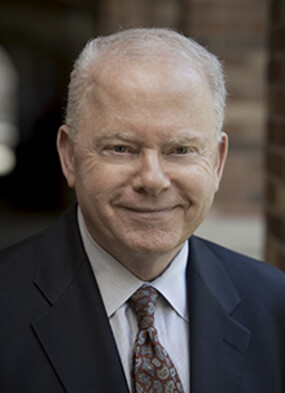Books
 History of the Common Law: The Development of Anglo-American Legal Institutions (Aspen Publishers 2009) (with Renee L. Lerner & Bruce P. Smith).
History of the Common Law: The Development of Anglo-American Legal Institutions (Aspen Publishers 2009) (with Renee L. Lerner & Bruce P. Smith).
 Pension and Employee Benefit Law (with David Pratt, Susan Stabile & Andrew Stumpff) (6th ed., Foundation Press 2015) (prior eds., 2010, 2006, 2000, 1995; 1990).
Pension and Employee Benefit Law (with David Pratt, Susan Stabile & Andrew Stumpff) (6th ed., Foundation Press 2015) (prior eds., 2010, 2006, 2000, 1995; 1990).
 History of the Yale Law School: The Tercentenary Lectures (with A. Kronman et al.) (Yale Univ. Press 2004)
History of the Yale Law School: The Tercentenary Lectures (with A. Kronman et al.) (Yale Univ. Press 2004)
 The Origins of Adversary Criminal Trial (Oxford Univ. Press 2003, paperback 2005) (2006, awarded Biennial Coif Book Award for outstanding American book in law)
The Origins of Adversary Criminal Trial (Oxford Univ. Press 2003, paperback 2005) (2006, awarded Biennial Coif Book Award for outstanding American book in law)

Uniform Statutes on Trusts and Estates: 2009-10 Edition (with Lawrence Waggoner) (Foundation Press 2009) (previous editions, since 1987).
 The Privilege Against Self-Incrimination: Its Origins and Development (with R.H. Helmholz et al.) (Univ. Chicago Press 1997)
The Privilege Against Self-Incrimination: Its Origins and Development (with R.H. Helmholz et al.) (Univ. Chicago Press 1997)

Comparative Criminal Procedure: Germany (West Pub. Co., American Casebook Series 1977)
 Torture and the Law of Proof: Europe and England in the Ancient Regime (Univ. Chicago Press 1977; paperback edition with new introduction, 2006)
Torture and the Law of Proof: Europe and England in the Ancient Regime (Univ. Chicago Press 1977; paperback edition with new introduction, 2006)
 Prosecuting Crime in the Renaissance: England, Germany, France (Harvard Univ. Press 1974, reprint edition 2005); Korean edition, (Korean Institute of Criminology 2012); excerpted in part and published in translation as “Die Carolina” in F.C. Schroeder, ed., Die Carolina: Die Peinliche Gerichtsordnung Kaiser Karls V. von 1532 (Wissenschaftliche Buchgesellschaft, Darmstadt 1986)
Prosecuting Crime in the Renaissance: England, Germany, France (Harvard Univ. Press 1974, reprint edition 2005); Korean edition, (Korean Institute of Criminology 2012); excerpted in part and published in translation as “Die Carolina” in F.C. Schroeder, ed., Die Carolina: Die Peinliche Gerichtsordnung Kaiser Karls V. von 1532 (Wissenschaftliche Buchgesellschaft, Darmstadt 1986)
Articles
Pension and Investment Law
Trust Law as Regulatory Law: The Unum/Provident Scandal and Judicial Review of Benefit Denials under ERISA, 101 Northwestern Univ. Law Review 1315 (2007)
“Social Security and the Private Pension System,” in In Search of Retirement Security: The Changing Mix of Social Insurance, Employee Benefits, and Individual Responsibility (T. Ghilarducci et al. eds.) (National Academy of Social Insurance 2005)
“What's Wrong with Employee Stock Pension Plans,” in Enron and Other Corporate Fiascos: The Corporate Scandal Reader 487 (Nancy B. Rapoport and Bala G. Dharan eds. 2d ed. 2009) (reproducing testimony presented to U.S. Senate Committee on Governmental Affairs, Jan. 24, 2002)
What ERISA Means by “Equitable”: The Supreme Court’s Trail of Error in Russell, Mertens, and Great-West, 103 Columbia Law Review 1317 (2003), substantially republished in NYU Review of Employee Benefits and Executive Compensation 2-1 (2004)
Trust-Investment Law in the United States: Main Themes of the Uniform Prudent Investor Act, Shintaku No. 189 (Feb. 1997) (in Japanese)
The Uniform Prudent Investor Act and the Future of Trust Investing, 81 Iowa Law Review 641 (1996); republished in Modern International Developments in Trust Law (D. Hayton, ed.) (1999)
The New American Trust-Investment Law, 8 Trust Law International 123 (1994)
Reversing the Nondelegation Rule of Trust-Investment Law, 59 Missouri Law Review 104 (1994) (William Fratcher memorial issue)
The Supreme Court Flunks Trusts, [1990] Supreme Court Review 207 (1991)
The Conundrum of Fiduciary Investing under ERISA, in Proxy Voting of Pension Plan Equity Securities 128 (D. McGill, ed.) (Wharton School: Pension Research Council 1989)
ERISA's Fundamental Contradiction: The Exclusive Benefit Rule (with Daniel R. Fischel), 55 Univ. Chicago Law Review 1105 (1988)
Social Investing of Pension Funds and University Endowments: Unprincipled, Futile, and Illegal, in Disinvestment: Is it Legal, Is it Moral? Is it Productive? (National Legal Center for the Public Interest, 1985)
Social Investing and the Law of Trusts (with Richard Posner), 79 Michigan Law Review 72 (1980)
Market Funds and Trust-Investment Law II (with Richard Posner), 1977 American Bar Foundation Research Journal l
The Revolution in Trust Investment Law (with Richard Posner), 62 American Bar Association Journal 887 (1976)
Market Funds and Trust-Investment Law (with Richard Posner), 1976 American Bar Foundation Research Journal 1
Trust and Estate Law
“Why the Rule in Saunders v. Vautier is Wrong,” in Equity and Administration (pp. 189-202) (Cambridge Univ. P, 2016) (P.G. Turner, ed.)
Destructive Federal Preemption of State Wealth Transfer Law in Beneficiary Designation Cases: Hillman Doubles Down on Egelhoff, 67 Vanderbilt Law Review 1665 (2014) (ACTEC Foundation Symposium on “The Federal Role in Private Wealth Transfer”)
Major Reforms of the Property Restatement and the Uniform Probate Code: Reformation, Harmless Error, and Nonprobate Transfers, 38 ACTEC L. J. 1 (2012).
Burn the Rembrandt? Trust Law's Limits on the Settlor's Power to Direct Investment, 90 Boston University L. Rev. 375 (2010)
Why Did Trust Law Become Statute Law in the United States?, 58 Alabama Law Review 1069 (2007) (Meador Lecture 2006)
Questioning the Trust-Law Duty of Loyalty: Sole Interest or Best Interest? 114 Yale Law Journal 929 (2005) (2006 Green Bag award, best written major article)
The Rise of the Management Trust, 143 Trusts & Estates Magazine 52 (Oct. 2004), republished in 4 Trusts Trimestrale di Approfondimento Scientifico e Professionale 338 (2005) (Italy)
Mandatory Rules in the Law of Trusts, 98 Northwestern Univ. Law Review 1105 (2004) (Hess Memorial Lecture of the Ass’n of the Bar of the City of New York, April 2002)
Curing Execution Errors and Mistaken Terms in Wills: The Restatement of Wills Delivers New Tools (and New Duties) for Probate Lawyers, 18 Probate & Property 28 (Jan./Feb. 2004); substantially republished in 51 Yale Law Report 36 (Sum. 2004)
The Uniform Trust Code: Codification of the Law of Trusts in the United States, 15 Trust Law International 69 (2001)
The Secret Life of the Trust: The Trust as an Instrument of Commerce, 107 Yale Law Journal 165 (1997); republished in Modern International Developments in Trust Law (D. Hayton, ed.) (1999)
The Contractarian Basis of the Law of Trusts, 105 Yale Law Journal 625 (1995)
Will Contests, 103 Yale Law Journal 2039 (1994) (review)
Reforming the Law of Gratuitous Transfers: The New Uniform Probate Code (with Lawrence Waggoner), 55 Albany Law Review 871 (1992) (Uniform Probate Code symposium issue)
The Inheritance Revolution, The Public Interest 15-31 (Winter 1991)
Education and Family Wealth, 20 Planning for Higher Education 1 (1991)
Taking a Look at the Pluses and Minuses of the Practice, Trusts & Estates Magazine 10-18 (Dec. 1989)
The Twentieth-Century Revolution in Family Wealth Transmission, 86 Michigan Law Review 722 (1988)
The Twentieth-Century Revolution in Family Wealth Transmission and the Future of the Probate Bar, 1988 Probate Lawyer 1 (American College of Probate Counsel)
Excusing Harmless Errors in the Execution of Wills: A Report on Australia's Tranquil Revolution in Probate Law, 87 Columbia Law Review 1 (1987)
Redesigning the Spouse's Forced Share (with Lawrence Waggoner), 22 Real Property, Probate and Trust Journal 303 (ABA 1987).
The Nonprobate Revolution and the Future of the Law of Succession, 97 Harvard Law Review 1108 (1984)
Reformation of Wills on the Ground of Mistake: Change of Direction in American Law? (with Lawrence Waggoner), 130 Univ. Pennsylvania Law Review 521 (1982)
“Defects of Form in the Execution of Wills: Australian and Other Experience with the Substantial Compliance Doctrine,” in American/Australian/New Zealand Law: Parallels and Contrasts 59 (ABA Press 1980)
Crumbling of the Wills Act: Australians Point the Way, 65 American Bar Association Journal 1192 (1979)
Living Probate: The Conservatorship Model, 77 Michigan Law Review 63 (1978)
Substantial Compliance with the Wills Act, 88 Harvard Law Review 489 (1975)
Comparative Law
Cultural Chauvinism in Comparative Law, 5 Cardozo Journal of International & Comparative Law 41 (1997)
Scholarly and Professional Objectives in Legal Education: American Trends and English Comparisons, in What Are Law Schools For? (P. Birks ed.) (Oxford Univ. Press 1996)
Money Talks, Clients Walk, Newsweek, April 17, 1995, at 32-34
The Influence of Comparative Procedure in the United States, 43 American Journal of Comparative Law 545 (1995) (United States National Report to the Tenth World Congress for Procedure Law).
“American Legal Education in Comparative Perspective,” in Legal Education in the Netherlands in a Comparative Context 55-64 (Grotius Academy 1995)
The Influence of the German Émigrés on American Law: The Curious Case of Civil and Criminal Procedure, in Einfluß deutschsprachiger juristischer Emigranten auf die Rechtsentwicklung in den USA und in Deutschland (Mohr Verlag, Tübingen 1993)
Trashing "The German Advantage," 82 Northwestern Law Review 763 (1988)
Comparative Civil Procedure and the Style of Complex Contracts, 35 American Journal of Comparative Law 381 (1987); republished in Der komplexe Langzeitvertrag/The Complex Long-Term Contract 445 (F. Nicklisch, ed.) (C.F. Müller Verlag, Heidelberg 1987); republished in German as Zivilprozessrechtsvergleichung und der Stil komplexer Vertragswerke, 86 Zeitschrift für vergleichende Rechtswissenschaft 141 (l987)
The German Advantage in Civil Procedure, 52 Univ. Chicago Law Review 823 (1985)
Mixed Court and Jury Court: Could the Continental Alternative Fill the American Need?, 1981 American Bar Foundation Research Journal 195
Land without Plea Bargaining: How the Germans Do It, 78 Michigan Law Review 204 (1979)
Judging Foreign Judges Badly: Nose Counting Isn't Enough, 18 Judges’ Journal 4 (Fall 1979)
Comparative Criminal Procedure: “Myth” and Reality (with Lloyd L. Weinreb), 87 Yale Law Journal 1549 (1978)
Controlling Prosecutorial Discretion in Germany, 41 Univ. Chicago Law Review 439 (1974)
Legal History
“The Demise of Trial in American Civil Procedure: How It Happened, Is It Convergence with European Civil Procedure?,” in Truth and Efficiency in Civil Litigation: Fundamental Aspects of Fact-finding and Evidence-Taking in a Comparative Context (C.H. van Rhee & Alan Uzelac, eds. 2012)
The Disappearance of Civil Trial in the United States, 122 Yale L.J. 522 (2012) (2013 Green Bag award, best written major article)
“Bifurcation and the Bench: The Influence of the Jury on English Conceptions of the Judiciary,” in Judges and Judging in the History of the Common Law and Civil Law: From Antiquity to Modern Times 67 (Paul Brand & Joshua Getzler eds. 2012)
"Blackstone on Judging," in Blackstone and His Commentaries: Biography, Law, History 65 (Wilfrid Prest ed. 2009)
"The Legal History of Torture," in Torture: A Collection 93 (Sanford Levinson ed.) (Oxford Univ. Press 2004)
Review, The Trial in History (Vol. 1, M. Mulholland & B. Pullan eds., Vol. 2, R.A. Melikan ed.), 119 English Historical Review 192 (Feb. 2004)
Trinity Hall and the Relations of European and English Law from the Fourteenth to the Twenty-First Centuries, in The Milestones Lectures (Cambridge, England 2001)
The Prosecutorial Origins of Defence Counsel in the Eighteenth Century: The Appearance of Solicitors, 58 Cambridge Law Journal 314 (1999) (awarded the Sutherland Prize, American Society for Legal History, 2000)
The Later History of Restitution, in Restitution Past, Present and Future: Essays in Honour of Gareth Jones 57-62 (Oxford 1998)
The Historical Foundations of the Law of Evidence: A View from the Ryder Sources, 96 Columbia Law Review 1168 (1996)
The Historical Origins of the Privilege Against Self-Incrimination at Common Law, 92 Michigan Law Review 1047 (1994)
Chancellor Kent and the History of Legal Literature, 93 Columbia Law Review 547 (1993)
On the Myth of Written Constitutions: The Disappearance of Criminal Jury Trial, 15 Harvard Journal of Law & Public Policy 119 (1992); published in translation, 17 Yonsei Law Review (Sept. 2007) (South Korea); 1996 Nueva Doctrina Penal 45 (Argentina)
“The English Criminal Trial Jury on the Eve of the French Revolution,” in The Trial Jury in England, France, Germany: 1700-1900 (Comparative Studies in Continental and AngloAmerican Legal History) (Duncker & Humblot, Berlin 1987)
Shaping the Eighteenth-Century Criminal Trial: A View from the Ryder Sources, 50 Univ. Chicago Law Review l (1983)
Albion's Fatal Flaws, Past and Present (No. 98, February 1983) 96-120
 Sir William Blackstone, Commentaries on the Laws of England, Volume III (Univ. Chicago Press, reprint ed. 1979), Introduction Reprinted 2002.
Sir William Blackstone, Commentaries on the Laws of England, Volume III (Univ. Chicago Press, reprint ed. 1979), Introduction Reprinted 2002.
Understanding the Short History of Plea Bargaining, 13 Law & Society Review 261 (1979)
Torture and Plea Bargaining, 46 Univ. Chicago Law Review 4 (1978); republished in Spanish as “Tortura Y Plea Bargaining,” in El Procedimiento Abreviado (J.B. Maier & A. Bovino eds.) (Buenos Aires 2001); substantially republished in The Public Interest (Winter 1980) at 43; latter version republished in The Public Interest on Crime and Punishment (N. Glazer ed. 1984)
The Criminal Trial Before the Lawyers, 45 Univ. Chicago Law Review 263 (1978)
The Historical Origins of the Sanction of Imprisonment for Serious Crime, 5 Journal of Legal Studies 35 (1976)
Fact Finding in the English Court of Chancery: A Rebuttal, 83 Yale Law Journal 1620 (1974)
The Origins of Public Prosecution at Common Law, 17 American Journal of Legal History 313
Advice to Students: Law Examinations
Writing Law Examinations
"Some years ago I prepared this little essay for the guidance of my students. When the essay began to circulate elsewhere, West Publishing volunteered to publish it in these pages with the thought that it might be of help to a wider audience. I hope it is."



 History of the Common Law: The Development of Anglo-American Legal Institutions (Aspen Publishers 2009) (with Renee L. Lerner & Bruce P. Smith).
History of the Common Law: The Development of Anglo-American Legal Institutions (Aspen Publishers 2009) (with Renee L. Lerner & Bruce P. Smith). Pension and Employee Benefit Law (with David Pratt, Susan Stabile & Andrew Stumpff) (6th ed., Foundation Press 2015) (prior eds., 2010, 2006, 2000, 1995; 1990).
Pension and Employee Benefit Law (with David Pratt, Susan Stabile & Andrew Stumpff) (6th ed., Foundation Press 2015) (prior eds., 2010, 2006, 2000, 1995; 1990). History of the Yale Law School: The Tercentenary Lectures (with A. Kronman et al.) (Yale Univ. Press 2004)
History of the Yale Law School: The Tercentenary Lectures (with A. Kronman et al.) (Yale Univ. Press 2004) The Origins of Adversary Criminal Trial (Oxford Univ. Press 2003, paperback 2005) (2006, awarded Biennial Coif Book Award for outstanding American book in law)
The Origins of Adversary Criminal Trial (Oxford Univ. Press 2003, paperback 2005) (2006, awarded Biennial Coif Book Award for outstanding American book in law)
 The Privilege Against Self-Incrimination: Its Origins and Development (with R.H. Helmholz et al.) (Univ. Chicago Press 1997)
The Privilege Against Self-Incrimination: Its Origins and Development (with R.H. Helmholz et al.) (Univ. Chicago Press 1997) 
 Torture and the Law of Proof: Europe and England in the Ancient Regime (Univ. Chicago Press 1977; paperback edition with new introduction, 2006)
Torture and the Law of Proof: Europe and England in the Ancient Regime (Univ. Chicago Press 1977; paperback edition with new introduction, 2006) Prosecuting Crime in the Renaissance: England, Germany, France (Harvard Univ. Press 1974, reprint edition 2005); Korean edition, (Korean Institute of Criminology 2012); excerpted in part and published in translation as “Die Carolina” in F.C. Schroeder, ed., Die Carolina: Die Peinliche Gerichtsordnung Kaiser Karls V. von 1532 (Wissenschaftliche Buchgesellschaft, Darmstadt 1986)
Prosecuting Crime in the Renaissance: England, Germany, France (Harvard Univ. Press 1974, reprint edition 2005); Korean edition, (Korean Institute of Criminology 2012); excerpted in part and published in translation as “Die Carolina” in F.C. Schroeder, ed., Die Carolina: Die Peinliche Gerichtsordnung Kaiser Karls V. von 1532 (Wissenschaftliche Buchgesellschaft, Darmstadt 1986) Sir William Blackstone, Commentaries on the Laws of England, Volume III (Univ. Chicago Press, reprint ed. 1979), Introduction Reprinted 2002.
Sir William Blackstone, Commentaries on the Laws of England, Volume III (Univ. Chicago Press, reprint ed. 1979), Introduction Reprinted 2002.